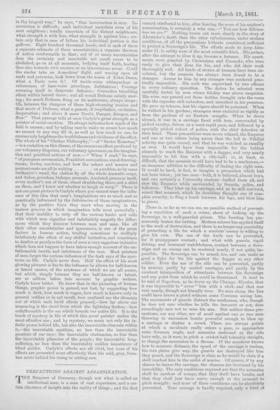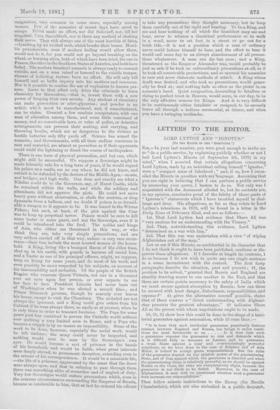PRECAUTIONS AGAINST ASSASSINATION.
THE Emperor of Germany, though not what is called an intellectual man, is a man of vast experience, and a cer- tain clearness of insight into the reality of things ; and the first
remark attributed to him, after hearing the news of his nephew's assassination, is certainly a wise one,—" You see how defence- less we are !" Nothing conies out more clearly in the story of Alexander's death than the utter valuelessness, under modern conditions, of all the precautions hitherto considered sufficient to protect a Sovereign's life. The efforts made to keep Alex- ander II. in safety were of the' most scientific kind. His palace, after the attempt to blow it up, became a fortress. His apart- ments were guarded by Circassians and Cossacks, who were ready to give their lives for his, and who did their work thoroughly well. All kinds of stories of treason have been cir- culated, but the assassin has always been found to be a stranger. Access to him by any stranger was rendered prac- tically impossible. His cook was supervised by two officers in every culinary operation. The dishes he selected were carefully tasted by men whose fidelity was above suspicion. His wine was poured out from bottles brought into the room with the capsules still unbroken, and uncorked in his presence. He gave up tobacco, lest his cigars should be poisoned. When he walked in his gardens, strangers were excluded as rigidly as from the gardens of an Eastern seraglio. When he drove abroad, it was in a carriage lined with iron, surrounded by picked cavalry, driven at a most rapid pace, and followed by a specially picked cohort of police, with the chief detective at their head. These precautions were never relaxed, the Emperor and one or two others being aware that the lull in Nihilist activity was quite unreal, and that he was watched as steadily as ever. It would have been impossible for the boldest assassin to reach the Emperor with a dagger, and very nearly impossible to hit him with a rifle-ball; or, at least, so difficult, that the assassin would have had to be a marksman,— an immense addition to the difficulty of finding the right man. It would be hard, in fact, to imagine a precaution which had not been taken ; yet two men—both, it is believed, almost boys, and one certainly a University student—baffled them all, and slew the Emperor while surrounded by Guards, police, and followers. They blew up his carriage, and as he still survived, seized. that moment, which he doubtless thought one of com- plete security, to fling a bomb between his legs, and blow him to pieces.
There is, so far as we can see, no possible method of prevent- ing a repetition of such a crime, short of locking up the Sovereign in a well-guarded prison. The bowling has per- manently beaten the batting. Modern science has applied itself to the work of destruction, and there is no longer any possibility of protecting a life for which a resolute' enemy is willing to give his own. The use of the knife can be prevented, for it presupposes contact; and what with guards, rapid driving, and incessant watchfulness, contact between a Sove- reign and an enemy can be rendered nearly, if not quite, im- possible. The Sovereign can be armed, too, and can make as good a fight for his life against the dagger as any other soldier. Even the use of the rifle can be prevented, partly by armour, partly by mailed carriages, and partly by the constant interposition of attendants between the Sovereign and any point from which he could be threatened. It used to be said of Napoleon, as he drove up the Champs Elys6es, that it was impossible to " cover" him with a stick, and that was very nearly, though not literally true. No man along the line could have drawn a pistol without some Corsican seeing him. The movements of guards distract the marksman, who, though he does not care whether he kills the innocent or not, does exceedingly care not to miss his aim. But neither these pre- cautions, nor any other, are of avail against one or two men throwing in succession bombs powerful enough to blow up a carriage or shatter a crowd. There are always points at which a cavalcade really enters a pass, or approaches some foreseen angle, and assassins stationed at the side have only, as it were, to pitch a cricket-ball tolerably straight, to change the succession to a throne. If the murderer knows how to measure distance, the speed of the carriage is useless, the iron plates give way., the guards are destroyed like him they guard, and the Sovereign is slain as he would be slain if a shell reached him in the midst of armies. Of course, if by any chance he leaves the carriage, the chances are increased by his immobility. The only conditions required are that the assassins shall be careless of escape, that they shall have bombs, and that they shall just have nerve enough at the moment to pitch straight ; and none of these conditions can be absolutely prevented. True courage is hardly required, only a kind of resignation, very common in some races, especially among women. Few of th3 assassins of recent days have cared to escape. 'Wel mada no effort, nor did Solovieff, nor, till her acquittal, Vera Sa.ssulitsch, nor is there any method of shaking their nerve. They risk always one of the most horrible of fates, —lynching by an excited mob, which breaks their bones. Horri- ble punishments, even if modern feeling would allow them, would not do it, for you could not go beyond breaking on the wheel, or burning alive, both of which have been tried, the one in France, the other in the Southern States of America, and both have failed. The modern fanatical assassin is always ready to commit suicide, and on a man raised or lowered to the suicide temper, threats of inflicting .torture have no effect. He will only kill himself, and so baffle inquiry into his motives and resources. Nor is it possible to confine the use of explosives to known per- sons. Laws to that effect only drive the criminals to learn chemistry for themselves,—that is, invest them with a new power of keeping their own secrets. Any student of chemistry can make gun-cotton or nitro-glycerine; and powder is an article whi.di must be manufactured, and, if manufactured, can be stolen. Granted a few resolute conspirators, with one man of education among them, and some little command of money, and no conceivable laws, or rules of police, or detective arrangements, can prevent their making, and carrying, and throwing bombs, which are as dangerous to the victims as hostile batteries only fifty yards off. Science has armed the assassin; and Governments, with all their endless resources in men and material, are almost as powerless as if their opponents could wield the lightning or direct the course of earthquakes.
There is one form of physical precaution, and but one, which might still be successful. We suppose a Sovereign might be made tolerably safe for a long term of years, if he would regard. his palace as a castle, see no one whom he did not know, and submit to be defended by the devices of the Middle Ages,—moats, and bridges, and high walls. One does not exactly see what a Nihilist could do to the Governor, say, of Hurst Castle, while he remained within the walls, and while the soldiery and attendants did not approve the plots. He could not move heavy guns without observation, or elude the sentries, or drop dynamite from a balloon, and we doubt if poison is so formid- able a weapon as it appears to be. It was feared in the Winter Palace ; but part, at least, of the plot against the Czar was to keep up perpetual terror. Poison would be sure to kill some taster or some guest, and not the Sovereign, even if it could be introduced into the food. The nobles and kings of Asia, who either are threatened in this way, or who think they are, take very simple precautions, and are very seldom carried off in that way, unless—a very rare occur- rence—their foes include the moot trusted women of the house- hold. A King, living like a besieged Baron. of the olden time, shut up in his castle, with guards in harness all round him, and a Taster as one of his principal officers, might, we suppose, keep on living for some years, and do most of his work, and even possibly be more respected by his subjects, on account of his inaccessibility and seclusion. Of the people of the British &Wire who venerate Queen Victoria, not one in a thousand. ever set eyes upon her person, or ever expects to see her face to face. President Lincoln had never been out of Washington when he was elected a secoud time ; and Prince Bismarck governs, though he scarcely ever leaves his house, except to visit the Chambers. The secluded are not always the ignorant, and a King could give orders from his Cabinet if he were always there, as easily as at present, when he is only there in order to transact business. Tho Pope for some years past has contrived to govern the Catholic world without ever quitting a very limited area in Rome, and a Pope who became a cripple is by no means an impossibility. Some of the work to be done, however, especially the social work, would be left undone; the army could never be inspected, and nothing would. ever be seen by the Sovereign's own eyes. He would become a sort of prisoner in the hands of his household, and would be liable, when great interests were deeply stirred, to permanent deception, extending even to the seizure of his correspondence. It would be a miserable life, —the life of a prisoner, aggravated by the sense that the doors were always open, and that in refusing to pass through them there was something alike of cowardice and of neglect of duty. Very few Sovereigns would endure precautions which, even in the extreme circumstances surrounding the Emperor of Russia, became so intolerable to him, that at last he ordered his officers to take any precautions they thought necessary, but to keep them carefully out of his sight and hearing. To be a King, and see and hear nothing of all which the humblest may see and hear, never to witness a theatrical performance or to walk in a wood, never to set foot. in a street or go out for a brisk ride, it is not a position which a man of ordinary nerve could induce himself to bear, and the effort to bear it would end some day in an abrupt abandonment of all precau- tions whatsoever. A man can die but once ; and a King, threatened as the Emperor Alexander was, would probably be just as safe if he took no extraordinary precautions at all, as if he took all conceivable precautions, and so spurred his assassins to new and more elaborate methods of attack. A King whose death was desired, and who took no precautions, would gener- ally be fired at; and nothing fails so often as the pistol in an assassin's hand. Quiet resignation, descending to fatalism or rising to perfect trust in Heaven, would seem, in our day, to be the only effective armour for Kings. And it is very difficult to be continuously either fatalistic or resigned, to be serenely brave all through a tedious ceremonial, at dinner, and when you have a twinging toothache.



































 Previous page
Previous page